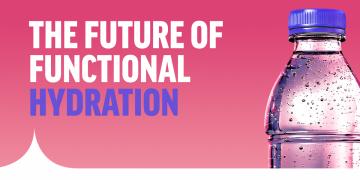People worldwide are living longer and by 2030, one in six people will be aged 60 years or over. By 2050, two-thirds of the world population over 60 years will live in low and middle-income countries. As the pace of population ageing increases, there will be continued pressure on brands to service the evolving and dynamic needs of this diverse group.
Food and beverage functional claims focus on greater fulfilment
As people age, maintaining a healthy diet becomes crucial to mitigating the risk of chronic diseases, and enhancing quality of life and longevity. Older adults generally have lower calorie needs, but often increased nutrient needs as the body absorbs them less efficiently. However, getting enough quality nutrition becomes more challenging as appetites shrink and swallowing, chewing and digesting can be harder.
Specially formulated and fortified food and beverages could become a lucrative market with an ageing population on the rise, yet less than 1% of global food and drink launches overtly targets 'seniors'. Brands can openly market to the older demographic in South America and Asia where traditional medicine is already incorporated into their diet, so cultural familiarity makes the concept of functional food and drink more acceptable. However, most Westerners buy health supplements as standalone products, being more sceptical about the science of functional food and resistant to being labelled as 'old'.
Fortified food and beverages also need to appeal to ageing taste buds and changing physiological needs. In the last five years, less than 500 food and drink launches have specifically targeted over-55s, generally avoiding specific health benefits, apart from bone health and digestion. However, emotion, not rationale, drives consumer choices, regardless of age. Functional foods must be affordable and taste good, so brands need to balance product benefits with value for money and more aspirational marketing.
Boost immunity
Over-55s prioritise physical health over mental health, particularly heart and joint health and immunity. They seek prevention as well as cure: they are most likely to consume food and drink that contains vitamin C, which is found in a wide variety of fruit and vegetables, to boost their immunity. Research suggests older people may need a greater variety of fibre to optimise gut health, yet few products promote the huge variety of gut-boosting and fibre-rich plants. A Mediterranean diet, rich in fibre, fruit and vegetables, is known to reduce inflammation in what is now referred to as 'inflamm-ageing' – linking age, inflammation and disease.
Research also suggests that older people may need more protein to counteract muscle mass loss and recent evidence suggests 'protein may play a pivotal role in maintenance of bone health'. Asia dominates in targeting bone health for older consumers. In China, 57% of over-55s buy milk specially designed for seniors, and 56% of over-55s are interested in milk powders with bone-strengthening functionality.
Address protein deficiency in older adults
After 50, people lose around 1% of muscle mass annually, and some studies suggest older people therefore need a higher protein intake. Brands need to invest in educating mature consumers on the need for more protein in their diet through drinks, snacks and meals.
Target heart health
Over-55s are interested in food and drink that supports heart health, but most do not want to pay more for it. Just 0.5% of global food and drink products focus on heart health, and most of these are whole grain-based, despite limited appeal to older consumers.

Focus on hydration in beverages
Studies suggest some older adults may be under-hydrated, partly due to a diminished thirst sensation, so there is an opportunity for brands to develop more flavoured and functional waters (without excess sugar or calories) which may incentivise older people to hydrate better. Over-55s are less likely to pay more for functional water, but a minority claim they would do so.
Help over-55s stay psychologically sharp
Ageing societies are driving the increase in retirement age from early to late sixties, meaning that workers will need to maintain peak mental performance for longer. Evidence indicates a decline in cognitive skills as people reach their sixties and beyond, yet few brands are currently targeting the cognitive ageing space. Growing awareness of the effects of ageing and diet on the brain is encouraging older adults to pay more attention to their brain health.
Many cognitive skills decline with age, particularly with a poor diet. A 20-year longitudinal study revealed that individuals aged 45-74 who closely followed the Mediterranean diet were cognitively two years younger at age 65 compared to those who did not. Convenience foods with ingredients like iron or iodine may help to maintain normal brain and cognitive function.
Ageing can be stressful, especially if individuals encounter health and mobility issues. Sleep issues may also worsen cognitive decline and changes in the brain may disrupt older people's sleep. Food and beverage brands can support better rest by using ingredients like melatonin and comforting herbal remedies in hot drinks. Walnuts are rich in compounds that promote and regulate sleep, including melatonin, serotonin, magnesium, potassium and calcium. Cherries are also abundant in four key compounds that regulate sleep: melatonin, tryptophan, potassium and serotonin.
Brands need to target older consumers
In 2024, UN data found that there are 1.7 billion over-55s globally, and the ageing of global societies will intensify over the next decade. While there is huge variation in wealth among the cohort, in many markets, they are relatively affluent compared to younger generations. Only a handful of food and drink brands currently target the older demographic’s needs, so there is still abundant opportunity to capitalise in this sector. However, functional launches must be supported with educational campaigns, especially in the West, where they generally remain more sceptical about age-related food and beverages.



